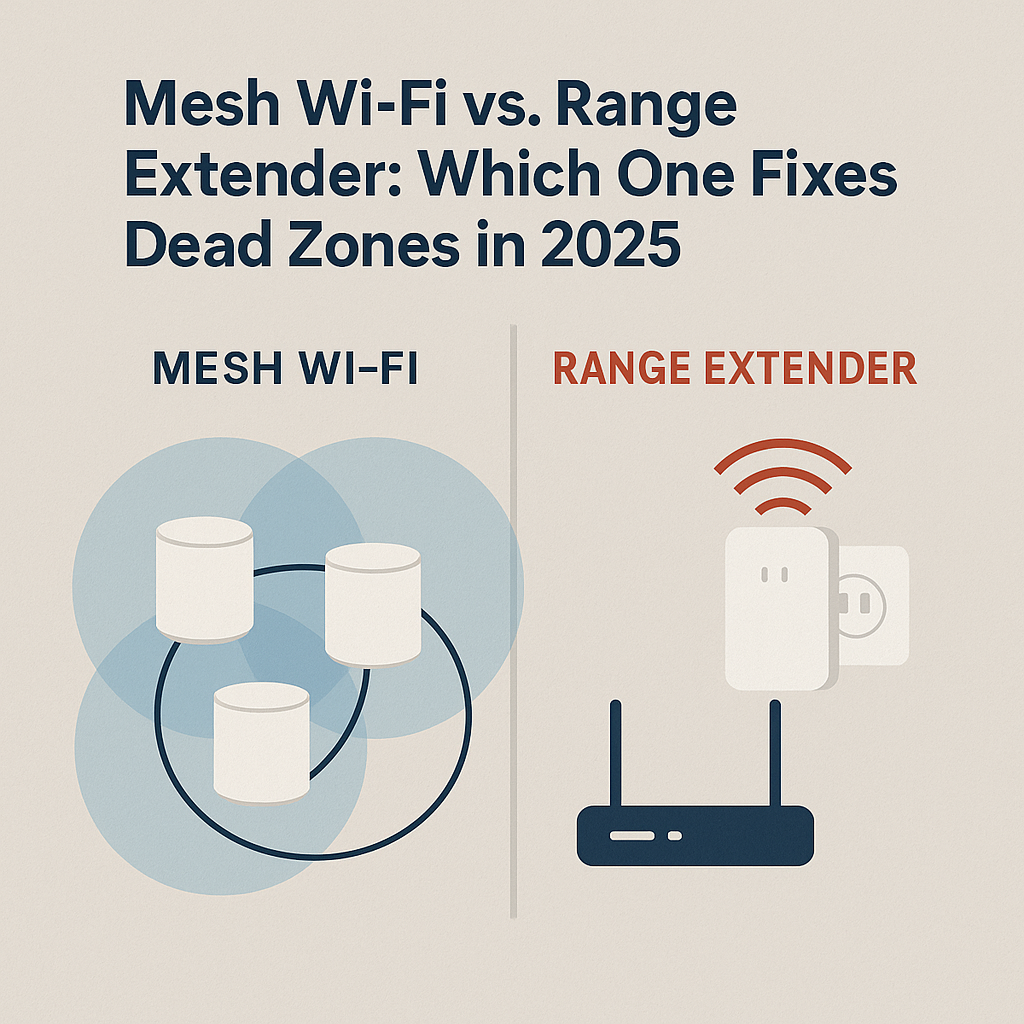Mesh Wi-Fi vs. Range Extender: Which One Fixes Dead Zones in 2025?
Slow internet and Wi-Fi dead zones are among the most frustrating problems for remote workers and home users. In 2025, the two most popular solutions are Mesh Wi-Fi systems and Wi-Fi range extenders. But which one is best for your home or office setup? In this guide, we’ll compare Mesh Wi-Fi vs. Range Extender systems, explain their pros and cons, and help you choose the right solution for a seamless connection.
What is Mesh Wi-Fi?
A Mesh Wi-Fi system uses multiple nodes placed around your home that all work together to create a single, seamless network. Unlike traditional routers, mesh systems ensure that you stay connected to the nearest node automatically, without needing to switch networks.
- ✅ Seamless roaming between nodes
- ✅ Strong coverage for large homes/offices
- ✅ Easy setup with mobile apps
- ❌ Typically more expensive
What is a Wi-Fi Range Extender?
A Wi-Fi range extender (or repeater) works by taking your router’s existing signal and rebroadcasting it to cover dead spots. Extenders are a budget-friendly way to extend coverage but often create a separate SSID (network name).
- ✅ Affordable and widely available
- ✅ Easy plug-and-play setup
- ❌ Creates a separate network (SSID)
- ❌ May reduce speeds by 50% or more
Mesh Wi-Fi vs. Range Extender: Key Differences
| Feature | Mesh Wi-Fi | Range Extender |
|---|---|---|
| Coverage | Large areas (up to 5,000+ sq. ft.) | Small to medium rooms |
| Speed | Full speed throughout network | Often cut in half |
| Network Name | One unified SSID | Separate SSID (may require switching) |
| Setup | Mobile app guided, user-friendly | Plug-in, basic setup |
| Cost | $$$ (Premium) | $ (Budget) |
Best Mesh Wi-Fi Systems in 2025
1. TP-Link Deco XE75
A Wi-Fi 6E mesh system with tri-band speeds, ideal for households with multiple devices and 4K streaming.
- Pros: Affordable for Wi-Fi 6E, easy app setup, strong coverage.
- Cons: Limited advanced settings.
2. Google Nest Wi-Fi Pro
Perfect for smart homes, with seamless integration with Google Assistant and strong parental controls.
- Pros: Excellent smart home features, simple setup, sleek design.
- Cons: No Ethernet backhaul on every unit.
3. Netgear Orbi RBKE963
One of the most powerful mesh systems, supporting Wi-Fi 6E with blazing speeds and enterprise-grade security.
- Pros: Top performance, huge coverage, excellent app.
- Cons: Expensive.
Best Wi-Fi Range Extenders in 2025
1. TP-Link RE715X
A Wi-Fi 6 range extender that boosts speeds and coverage for budget-conscious users.
- Pros: Affordable, supports Wi-Fi 6, simple installation.
- Cons: Still creates a second SSID.
2. Netgear Nighthawk EAX20
A higher-end extender with Wi-Fi 6 support, Ethernet ports, and better reliability for gaming and streaming.
- Pros: Strong performance, Ethernet ports, stable speeds.
- Cons: Bulkier design.
Which One Should You Choose?
– Choose Mesh Wi-Fi if you have a large home, multiple floors, or need seamless roaming with no interruptions.
– Choose a Range Extender if you’re on a tight budget and only need to fix a dead zone in one or two rooms.
FAQ
Does Mesh Wi-Fi replace my existing router?
Yes, most mesh systems act as a full router replacement, though some can work alongside your ISP modem.
Will a Wi-Fi extender reduce my speed?
Yes, most extenders cut bandwidth in half since they repeat the signal. Wi-Fi 6 extenders perform better but still have some loss.
Is Mesh Wi-Fi worth the higher cost?
For large homes or families with many connected devices, Mesh Wi-Fi is absolutely worth it in 2025.
Final Thoughts
Both solutions can fix Wi-Fi dead zones, but the right choice depends on your budget and space. If you want the best Wi-Fi coverage in 2025, go with a mesh system like the TP-Link Deco XE75 or Google Nest Wi-Fi Pro. If you just need a quick and cheap fix, a range extender like the TP-Link RE715X is the way to go.
Ready to upgrade your home network? Click below to see the latest deals.
Disclosure: As an Amazon Associate I earn from qualifying purchases.



